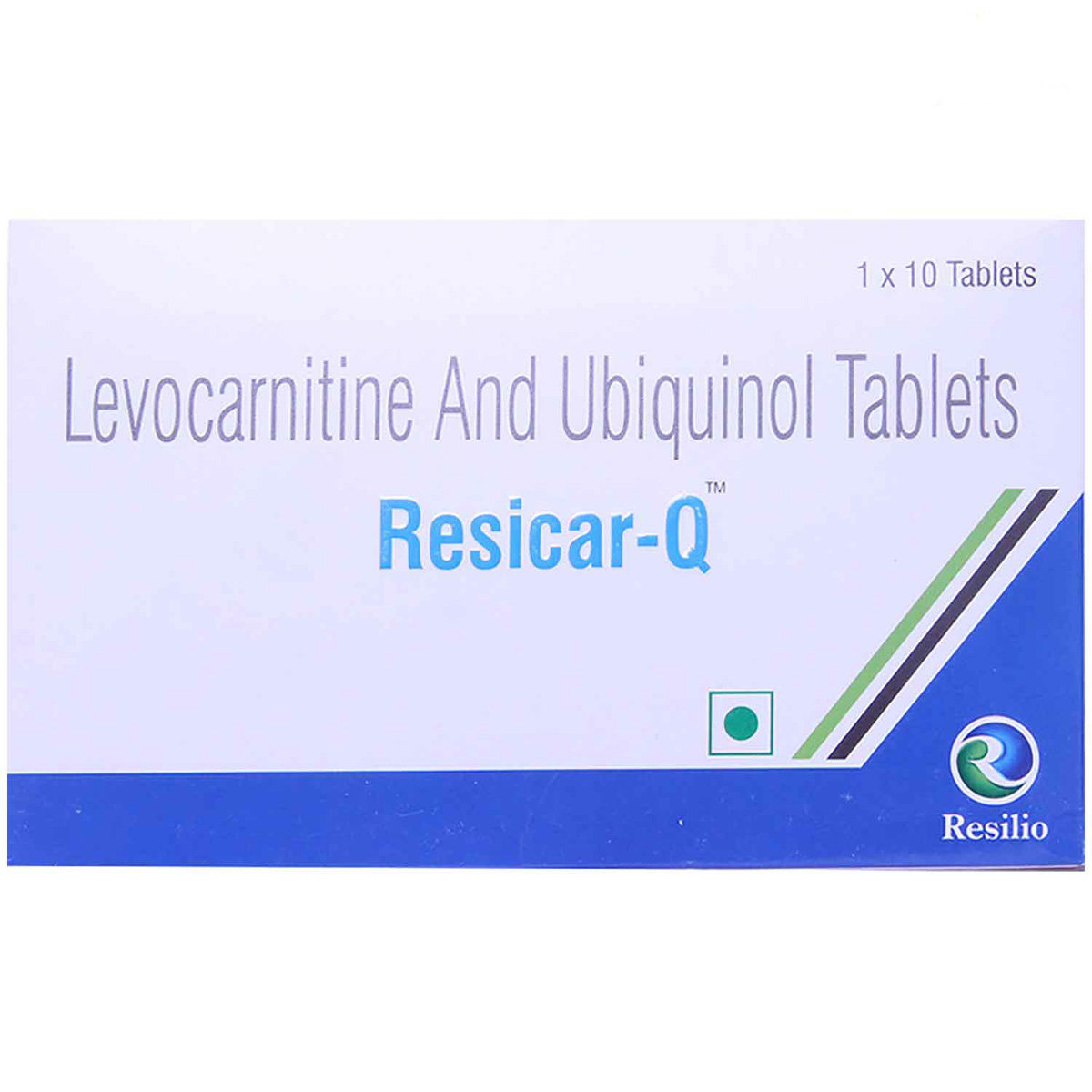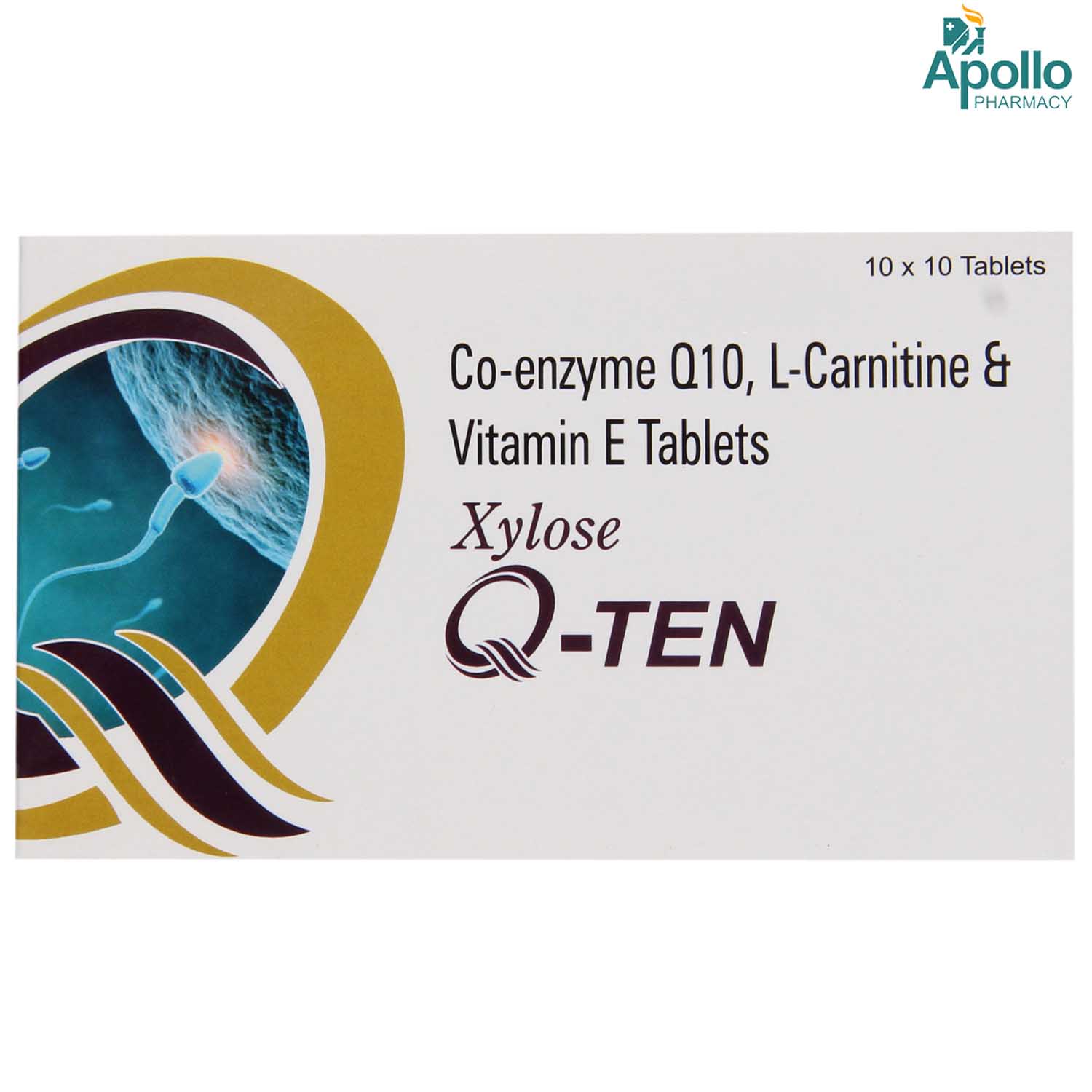Ubiquinone+levocarnitine
About Ubiquinone+levocarnitine
Levocarnitine+ubiquinone belongs to the class of 'Nutritional supplements,' primarily used to treat nutritional deficiencies due to various complications or long-term diseases. It is used to improve and prevent heart attack symptoms, hypertension (high blood pressure), congestive heart failure, muscular dystrophy, macular degeneration (age-related vision loss), migraine headache, fertility problems, and to slow the progression of Parkinson's disease.
Levocarnitine+ubiquinone contains Ubiquinone (CoQ10) and Levocarnitine. Ubiquinone is an antioxidant that protects the body from damage by chemicals (free radicals). Levocarnitine is a naturally occurring amino acid derivative that helps your body turn fat into energy. It works by improving the low levels of carnitine in the body. A Levocarnitine+ubiquinone is used to treat ubiquinone and carnitine deficiencies and liver, heart, and muscle problems.
Take Levocarnitine+ubiquinone as prescribed by your doctor. You are advised to take Levocarnitine+ubiquinone for as long as your doctor has prescribed it for you, depending on your medical condition. Some people may experience nausea and vomiting, abdominal cramps, and diarrhoea. Most of these side effects of Levocarnitine+ubiquinone do not require medical attention and typically resolve on their own over time. However, if the side effects persist or worsen, please consult your doctor.
Let your doctor know if you are using prescription, non-prescription drugs, and herbal products before starting Levocarnitine+ubiquinone. If you are known to be allergic to Levocarnitine+ubiquinone or its inactive components, please inform your doctor. Please inform your doctor if you have malabsorption syndrome (difficulty absorbing nutrients from food), so that they can adjust the dosage form accordingly. If you are a pregnant or breastfeeding mother, please consult your doctor before taking Levocarnitine+ubiquinone. Levocarnitine+ubiquinone is safe to use in children, yet the doctor's consultation is advised. If you have a history of seizures (fits), liver disease, kidney disease, diabetes, or heart problems, please inform your doctor before using Levocarnitine+ubiquinone.
Uses of Ubiquinone+levocarnitine
• Serves as an alternative source of essential nutrients in individuals with dietary deficiencies.
• Replenish carnitine and ubiquinone levels in individuals with deficiencies. • Provides antioxidant support and protects cells from damage by free radicals.
• Improve energy metabolism in patients with mitochondrial dysfunction.
• Improves symptoms of heart failure and lowers high blood pressure.
• Reduces fatigue by boosting energy levels.
• Reduces muscle pain and weakness in individuals with muscle-related disorders.
• Reduces nerve pain and damage caused by diabetic neuropathy.
• Slows the progression of Parkinson's disease.
Medicinal Benefits
Levocarnitine+ubiquinone consists of nutritional supplements, Ubiquinone (CoQ10) and Levocarnitine, used to treat dietary deficiencies and address issues related to the liver, heart, and muscles. Ubiquinone is a naturally occurring quinone in most aerobic organisms, from bacteria to mammals. CoQ10 is an antioxidant that protects the body from damage by chemicals (free radicals). Levocarnitine is a naturally occurring amino acid derivative that helps your body turn fat into energy. It works by improving the low levels of carnitine in the body. Collectively, Levocarnitine+ubiquinone improves symptoms and increases exercise ability in people with heart problems. Levocarnitine+ubiquinone improves symptoms such as a rapid or pounding heartbeat, nervousness, and weakness in people with high levels of thyroid hormone. It is also used for weight loss and may have an impact on brain function. Levocarnitine+ubiquinone increases sperm count and sperm movement in men with fertility problems. It is also used to prevent and treat carnitine deficiency in patients with end-stage renal disease who are undergoing dialysis.
Directions for Use
- Levocarnitine+ubiquinone can be taken with food to help reduce the risk of stomach upset.
- It is recommended to take Levocarnitine+ubiquinone 1-2 times daily or as advised by your doctor.
- Swallow Levocarnitine+ubiquinone as a whole with a glass of water.
- Do not crush, chew, or break it.
Storage
Side Effects of Ubiquinone+levocarnitine
- Nausea
- Vomiting
- Abdominal cramps
- Diarrhea
- Hypotension (low blood pressure)
- Heartburn
- Stomach pain
- Constipation
- Headache
- Swelling of face, lips, tongue, or throat
Drug Warnings
Do not use Levocarnitine+ubiquinone if you are allergic to Levocarnitine+ubiquinone or its contents. If you are pregnant or breastfeeding, think you may be pregnant, or are planning to have a baby, ask your doctor for advice before taking Levocarnitine+ubiquinone. Do not give a child Levocarnitine+ubiquinone or any other herbal/ health supplements unless prescribed by the doctor. Let your doctor know if you have a history of seizures (fits), liver disease, kidney disease, or diabetes before using Levocarnitine+ubiquinone. Please inform your doctor if you are using any prescription and non-prescription medications, including vitamins and herbal supplements. If you need surgery, stop taking Levocarnitine+ubiquinone at least 2 weeks ahead of time. A regular blood test and urine test are recommended to monitor the carnitine levels in the body if you are on long-term treatment with Levocarnitine+ubiquinone.
Drug Interactions
Drug-Drug Interaction: Levocarnitine+ubiquinone may interact with blood thinners (warfarin, dicumarol, anisindione).
Drug-Food Interaction: No interaction found.
Drug-Disease Interaction: Levocarnitine+ubiquinone should be used with caution in patients with low blood pressure, severe kidney, and liver disease, diabetes, and seizures (fits).
Drug-Drug Interactions Checker List:
Safety Advice

Alcohol
cautionThe interaction of alcohol with Levocarnitine+ubiquinone is unknown. Please consult a doctor before consuming alcohol while using Levocarnitine+ubiquinone.

Pregnancy
cautionIf you are pregnant, do not use Levocarnitine+ubiquinone without medical advice.

Breast Feeding
cautionIf you are breastfeeding, do not use Levocarnitine+ubiquinone without medical advice.

Driving
cautionLevocarnitine+ubiquinone is generally safe to use before driving. However, if you notice any side effects, such as dizziness, avoid driving and operating machinery until you feel better.

Liver
cautionPlease consult your doctor to know if Levocarnitine+ubiquinone is safe for you if you have liver disease.

Kidney
cautionPlease consult your doctor to know if Levocarnitine+ubiquinone is safe for you if you have kidney disease.

Children
safe if prescribedSafe to be given to children below 12 years. No harmful interaction has been reported in children below 12 years of age. However, consult your doctor before using Levocarnitine+ubiquinone in children.
Habit Forming
Diet & Lifestyle Advise
- Eat a diet rich in whole grains, vegetables, and fruits.
- Animal products, such as meat, fish, poultry, and milk, are the best sources.
- Increase your intake of calcium- and magnesium-rich foods, such as prunes, raisins, and orange juice, in your diet.
- Opt for low-fat dairy products (low-fat yoghurt, fat-free milk, cheese, etc.).
- Include more vegetables, fruits, low-fat dairy, whole grains, and nuts in your diet.
- Make a habit of regular exercise for at least 1-2 hours a day, or at least walk for about half an hour, for good health.
- Reduce your intake of saturated fats (or hidden fats) in foods like chips, crisps, pastries, biscuits, and samosas. Choose omega-3 fatty acid-containing oils for daily cooking. For frying, you can use palm oil, mustard oil, groundnut oil, rice bran oil, and safflower oil.
- Avoid smoking and alcohol consumption.
Special Advise
Monitor your blood glucose levels regularly while taking Levocarnitine+ubiquinone.
Patients Concern
Disease/Condition Glossary
Carnitine deficiency: It occurs when not enough of the nutrient carnitine is available to the body. This can cause muscle weakness and heart or liver problems. Carnitine is obtained from foods, particularly those of animal origin. A carnitine deficiency occurs when the body does not absorb or get enough amount of carnitine from food. It is essential for a healthy life. Sometimes your body is unable to absorb carnitine even if you are consuming it. Carnitine deficiency can lead to various health problems, including encephalopathy (severe brain dysfunction), myopathy (muscle disease), hypoglycemia (low blood sugar) if the liver is affected, cardiomyopathy (a heart problem), or swelling (oedema). Carnitine deficiency symptoms are weakness in the hips, shoulders, upper arms, and legs, heart muscles, tiredness (fatigue), irritability, delayed movement (motor) development, and poor feeding in a baby.
Ubiquinone (coenzyme Q10) deficiency: It is a disorder in which your body doesn't have adequate levels of an enzyme called coenzyme Q10. This can affect many parts of the body, especially the brain, muscles, and kidneys. CoQ10 is present in every cell of the body and provides energy to the body. However, the highest concentrations are found in organs with the greatest energy demands, such as the heart, kidneys, lungs, and liver. Your body produces CoQ10 naturally, but its production tends to decrease with age. You can also get CoQ10 through supplements or foods. Other causes of CoQ10 deficiency include nutritional deficiencies, such as vitamin B6 deficiency, genetic defects in CoQ10 synthesis or utilisation, increased demands by tissues as a consequence of disease, mitochondrial diseases, and side effects of statin treatments. Ubiquinone deficiency symptoms include physical fatigue and muscle weakness, even while undertaking relatively non-strenuous physical activities such as walking.
FAQs
Levocarnitine+ubiquinone is used to treat nutritional deficiencies due to various complications or long-term diseases. It is used to improve and prevent heart attack symptoms, hypertension (high blood pressure), congestive heart failure, muscular dystrophy, macular degeneration (age-related vision loss), migraine headache, fertility problems, and to slow the progression of Parkinson's disease.
Levocarnitine+ubiquinone Ubiquinone (Coenzyme Q10) and Levocarnitine. Ubiquinone is an antioxidant which protects the body from damage by chemicals (free radicals). Levocarnitine works by improving the low levels of carnitine in the body.
Carnitine deficiency occurs when your body lacks adequate carnitine levels. You can overcome this deficiency by including food sources rich in carnitine like meat, fish, poultry, milk, eggs, beef, pork, chicken or turkey fish. If your carnitine levels are still low, your doctor may prescribe supplements.
In some patients, warfarin and other blood thinners, when taken along with Levocarnitine+ubiquinone may increase the time required for the formation of blood clots. Hence, before starting Levocarnitine+ubiquinone, inform your doctor if you are taking warfarin or any other blood thinner.
You are recommended to take Levocarnitine+ubiquinone for as long as your doctor has prescribed it. However, if the symptoms persist or worsen with diarrhoea, stomach pain, nausea, and vomiting using of Levocarnitine+ubiquinone, please consult your doctor.
Levocarnitine+ubiquinone is generally considered safe when used at the recommended dose and for the duration prescribed by your doctor. While it is usually well-tolerated, Levocarnitine+ubiquinone may cause mild side effects such as stomach upset, nausea, or vomiting. These side effects typically resolve on their own over time. If you have any concerns about the safety of Levocarnitine+ubiquinone, always consult your healthcare provider.
No, Levocarnitine+ubiquinone does not cause weight gain. However, Levocarnitine (one of its ingredients) is known to help the body burn fat for energy, which may lead to weight loss. If you notice any unexpected changes in your weight, please talk to your doctor.
Levocarnitine+ubiquinone may take a few weeks or longer to show improvement in your symptoms, depending on the severity of the condition. It is essential to use this medicine as directed. If your symptoms do not improve or if they get worse, consult your doctor.
Levocarnitine+ubiquinone may cause common side effects such as Nausea, vomiting, abdominal cramps, diarrhea, hypotension (low blood pressure), heartburn, stomach pain, constipation, and headaches. Most of these side effects of Levocarnitine+ubiquinone do not require medical attention and gradually resolve over time. However, if the side effects persist or worsen, please consult your doctor.




